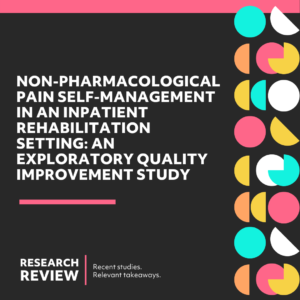 The EIM’s pain team is publishing again! This paper studied training nurses in an inpatient rehab setting more about pain to influence patients to choose self-help, pharmacological treatments for their pain (over meds).
The EIM’s pain team is publishing again! This paper studied training nurses in an inpatient rehab setting more about pain to influence patients to choose self-help, pharmacological treatments for their pain (over meds).
Abstract
Background: Pain neuroscience education (PNE) is well-studied and described in outpatient clinical settings but not inpatient clinical environments.
Objective: To assess if PNE nursing education in an inpatient rehabilitation setting would yield positives shifts in patient choices for non-pharmacological treatment choices for pain and increase self-efficacy and self-management of pain. Design: Quality improvement study
Methods: Nursing staff at an inpatient rehabilitation facility underwent training in PNE, non-pharmacological approaches to pain and emotional/spiritual support, guided imagery/relaxation techniques and therapeutic presence/touch. Prior to implementation of the training, and following training, a convenience sample of 25 patients (50 total) charts were reviewed to determine if patients received a Pain Control and Comfort menu showcasing various non-pharmacological and selfmanagement strategies for their pain. Additionally, patients’ beliefs and self-efficacy was measured at the time of admission and discharge to determine if exposure to trained nurses altered their self-efficacy during the course of inpatient care.
Results: Following training there was a 50.2% increase in non-pharmacological choices to manage pain and specific to the nursing education, there was a 347% increase in utilization of emotional/spiritual support, guided imagery/relaxation techniques, and therapeutic presence/touch to self-manage pain. For pain self-efficacy for dressing, bathing and ability to go to the bathroom, during the pre-improvement period, the mean score at admission for these tasks was at 7.27 and at discharge 9.16, showcasing a 26% positive shift. In the post-improvement period, the mean at-admission score for the 3 functional tasks was 5.69 points but at discharge increased to 9.11 points (61% increase).
Conclusion: PNE training to nurses in an inpatient rehabilitation setting yield various positive changes including increased exposure to and use of a pain menu designed to foster increased use of non-pharmacological treatments for pain and foster increased self-efficacy and self-management by the patients
Keywords: Pain; Nursing; Pain Neuroscience Education; Inpatient Rehabilitation; Self-Management
Citation: Louw A, et al. Non-Pharmacological Pain Self-Management in an Inpatient Rehabilitation Setting: An Exploratory Quality Improvement Study. Ann Physiother Occup Ther 2022, 5(2): 000230.


